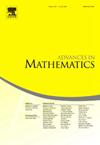The geometric concentration theorem
IF 1.5
1区 数学
Q1 MATHEMATICS
引用次数: 0
Abstract
We establish a purely geometric form of the concentration theorem (also called localization theorem) for actions of a linearly reductive group G on an affine scheme X over an affine base scheme S. It asserts the existence of a G-representation without trivial summand over S, which acquires over X an equivariant section vanishing precisely at the fixed locus of X.
As a consequence, we show that the equivariant stable motivic homotopy theory of a scheme with an action of a linearly reductive group is equivalent to that of the fixed locus, upon inverting appropriate maps, namely the Euler classes of representations without trivial summands. We also discuss consequences for equivariant cohomology theories obtained using Borel's construction. This recovers most known forms of the concentration theorem in algebraic geometry, and yields generalizations valid beyond the setting of actions of diagonalizable groups on one hand, and that of oriented cohomology theories on the other hand.
Finally, we derive a version of Smith theory for motivic cohomology, following the approach of Dwyer–Wilkerson in topology.
求助全文
约1分钟内获得全文
求助全文
来源期刊

Advances in Mathematics
数学-数学
CiteScore
2.80
自引率
5.90%
发文量
497
审稿时长
7.5 months
期刊介绍:
Emphasizing contributions that represent significant advances in all areas of pure mathematics, Advances in Mathematics provides research mathematicians with an effective medium for communicating important recent developments in their areas of specialization to colleagues and to scientists in related disciplines.
 求助内容:
求助内容: 应助结果提醒方式:
应助结果提醒方式:


